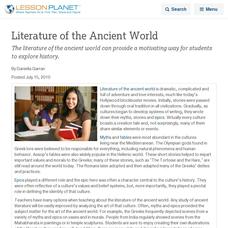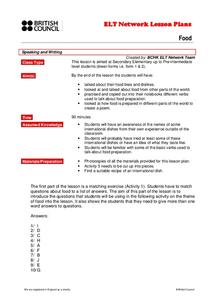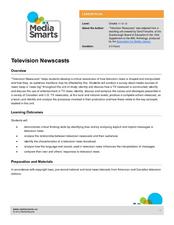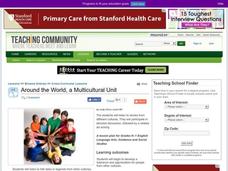Curated OER
The Language of Human Rights
Did you know that there are 15.2 million refugees in the world? High schoolers will read "The Universal Declaration of Human Rights" and learn how they can get involved to lower this surprising number. To really encourage involvement,...
Folger Shakespeare Library
Essential Everyday Bravery
Shakespeare's plays may be old, but they still have relevant lessons for today's world! A collection of lesson plans uses examples from The Merchant of Venice and District Merchants to teach about bravery. In addition to learning...
Speak Truth to Power
Elie Wiesel: Speaking Truth to Genocide to Power
Invite your learners to discover the efforts of Night author Elie Wiesel to promote awareness of genocide in the world. After watching and reading an interview of Elie Wiesel, high schoolers work to create a living Holocaust museum by...
Rainforest Alliance
Forests of Guatemala
With 90 percent of its land area covered in forests, Suriname, a country in South America, contains the largest percentage of forests throughout the world. Here is an activity that brings classmates together to learn about the...
Curated OER
Modern American Theatre: Intro to Drama
Set this slideshow up at as an independent work station, or to provide your theater arts class with a look at the many manifestations of modern literary drama. Tennessee Williams, Edward Albee, and Arthur Miller are the focus of the...
August House
Go to Sleep, Gecko
Use this multidisciplinary lesson to delve into these subjects: English language arts, math, science, drama, and character education. After reading, discussing, and making interpretations about Go To Sleep, Gecko!: A Balinese Folktale by...
Curated OER
Pastimes: Music and Dance
Play the lively music of flamenco and tango for your emerging Spanish speakers, and introduce them to popular dances from Spanish-speaking countries around the world. Discuss various types of music and dance, showing either pictures or...
National Gallery of Canada
Self-Portrait, Mirrors and Metamorphosis!
Using M.C. Escher's Hand with Reflecting Sphere as inspiration, learners create their own set of self-portraits using various reflective surfaces. The lesson begins with a discussion about portraiture and ends with a presentation of work...
Harper Collins
Amazing Women
Helen Keller became a teacher after her experience with Anne Sullivan, demonstrating to the world how valuable a dedicated mentor and determined spirit can be when overcoming adversity. Middle schoolers learn more about the influential...
Curated OER
Different Strokes For Different Folktales
Young readers use graphic organizers, such as Venn diagrams and story maps, to analyze a variety of folktales and the elements of a story. They use writing, sequencing activities, and creative art to identify the morals learned from a...
Curated OER
Reverse Pastel Paintings
Create a unique spin on reverse painting with oil pastels and acetate. The combination results in a beautiful and vibrant art piece. This is a great project to introduce your class to oil pastels.
Tayasui.com
Drawing with Carl
Who is Carl? Carl is a little monster that will help your learners draw and create in any way imaginable. Get those kids to activate creative and imaginative thinking skills with a really fun app. There are endless options that can...
Curated OER
Literature of the Ancient World
The literature of the ancient world can provide a motivating way for students to explore history.
Curated OER
Mandala Art Lessons
Mandala art lessons provide easy and fun ways to learn about art, math, and other cultures.
Curated OER
Food
Students, discussing/brainstorming about food likes/dislikes all around the world with vivid verbs to talk about food preparation, create an original poem on how food is prepared in different parts of the world.
Curated OER
Problems with our Food System: Hunger
Students understand that hunger causes many deaths a year and many children are trapped as slaves through watching a video. In this hunger and child slavery instructional activity, students write letters to call attention to the problems...
Curated OER
Consumer Confusion: Wants versus Needs and Gandhi's Wisdom
Fourth graders create graphs to illustrate consumer consumption throughout the world. In this consumer lesson plan, 4th graders also discuss wants and needs around the world, and consider Gandhi's opinion on material possessions as they...
Curated OER
Delegating Authorities
Students compare and contrast democracies around the world after reading a New York Times article. They create posters and participate in a "democracy roundtable" in which they discuss two democracies.
Curated OER
Birth and Early Childhood
Eighth graders read and compare creation stories of different cultures around the world. They identify and define the concept of the cycle of life and collect and analyze birth and childhood folk beliefs and stories in their families...
Curated OER
The Basic Shapes of Everything
Students explore basic shapes in art. In this sketching lesson, students discover that art is created from basic shapes. Students determine the basic shapes in a picture and recreate the image.
Curated OER
Television Newscasts
When we watch news broadcasts on television, we receive a much more visual perspective than when we read the newspaper. How do sets, clothing, and music contribute to our understanding of the story? Compare American and Canadian news...
Curated OER
Around the World, A Multicultural Unit
Students investigate Native American tribes through their stories. In this cultural lesson, students read stories of the Inuit tribe and discuss the themes, people, and customs. Students illustrate a picture of the Inuit tribe...
Curated OER
History Trifold in Publisher
Students create a timeline of events happening around the world. In this timeline lesson plan, students use Microsoft Publisher to create a timeline of events happening around the world as they live their lives presently.
Curated OER
The War of the Worlds
Students discover the concept of media based on literature. In this War of the Worlds lesson, students read the novel The War of the Worlds by H.G. Wells and listen to the 1938 radio broadcast adaptation by Orson Welles. Students then...

























